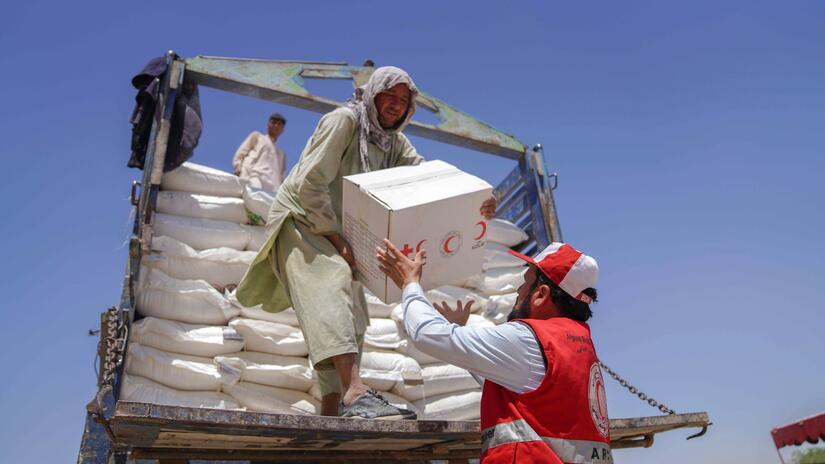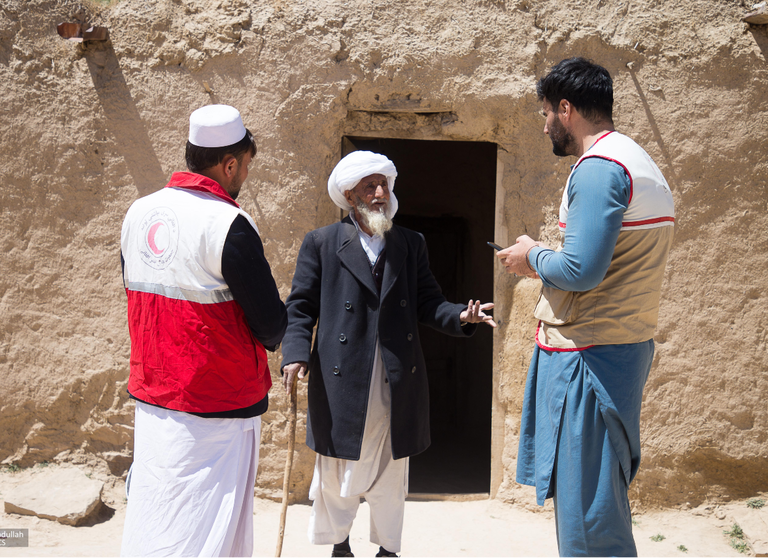Kabul/Kuala Lumpur/Geneva, 15 August – Economic hardships have sharply intensified living conditions in Afghanistan. The International Federation of Red Cross and Red Crescent Societies (IFRC) calls for continued humanitarian support to Afghanistan, coupled with investment in long-term solutions.
More than two years after drought began affecting the region, nearly 28 million Afghans – both in cities and remote areas – struggle to meet basic needs. Economic hardships and continuous shocks have greatly diminished buying power, making many reliant on humanitarian assistance.
Mawlawi Mutiul Haq Khales, Afghan Red Crescent Society Acting President, said:
“The economic situation remains challenging for vulnerable Afghans, including women and girls. They have endured immense hardships and primarily rely on humanitarian assistance to get through shocks brought by drought, natural disasters, and economic hardship.”
“Thanks to generous support from our local and international partners, the Afghan Red Crescent has expanded its response operation across all provinces in the first half of this year, aiming to prevent worsening humanitarian situations.”
With the support of local and international partners, the Afghan Red Crescent has reached more than 500,000 households (approximately 3.5 million people) with a range of services. These include 3 million people with health services and awareness, more than 100,000 households (around 700,000 people) with food assistance, and at least 35,000 households (around 245,000 people) with cash assistance.
“Now, due to reduced funding and increasing demand for services, we are prioritizing assistance to the most vulnerable. This includes providing cash assistance for widows, offering mental health and psychosocial support, and supporting children with congenital heart defects. For this, we request our partners to bolster their contributions,” Mawlawi Mutiul Haq Khales added.
Afghanistan is grappling not only with its third consecutive year of drought but also with economic hardships that exacerbate the ongoing humanitarian situation. The current trend of foreign aid, primarily limited to humanitarian interventions due to sanctions or lack of international recognition of the current authorities, hinders long-term solution efforts.
Necephor Mghendi, IFRC’s Head of Delegation for Afghanistan, said:
“The humanitarian situation is becoming harsher, and we are increasing our support to the Afghan Red Crescent—with limited financial resources—to alleviate conditions for people most at risk, keeping in mind the need to combine immediate assistance with durable solutions that also address root-causes and vulnerabilities.”
“We can’t address the humanitarian situation without investing in longer-term development solutions or addressing the economic crisis. They are intrinsically linked.”
“As some parts of the world also grapple with man-made and natural hazards, people should not forget that Afghanistan is still facing one of the worst humanitarian crises in the world. Though headlines might emphasize a few issues, the vast array of needs remain.”
The IFRC and Afghan Red Crescent are increasing preparedness for the upcoming winter and ever-present potential disasters. Stocks of winterization kits, tarps, tents, water storage containers, hygiene supplies, cooking utensils, and other essential household items are being pre-positioned in strategic locations across the country. Furthermore, Afghan Red Crescent disaster response teams are being equipped with updated data collection kits, identification materials, and refresher training.
The Afghan Red Crescent Society has a branch in each province of the country, boasts a strong network of 24,600 volunteers, including women who are crucial to delivering services to vulnerable groups, especially women and girls. Community members – men, boys, women, and girls – remain central to the efforts of the Red Cross and Red Crescent: as recipients, designers, and deliverers.
To support the Afghan Red Crescent, the IFRC revises its emergency appeal to the international community for 120 million Swiss francs to deliver urgent humanitarian aid to over two million people affected by multiple crises.
For more information or to arrange an interview, contact:
Afghanistan: Mir Abdul Tawab Razavy, +93-747-407-027, [email protected]
Kuala Lumpur: Afrhill Rances, +60-192-713-641, [email protected]
Geneva: Mrinalini Santhanam, +41 76 381 50 06, [email protected]





